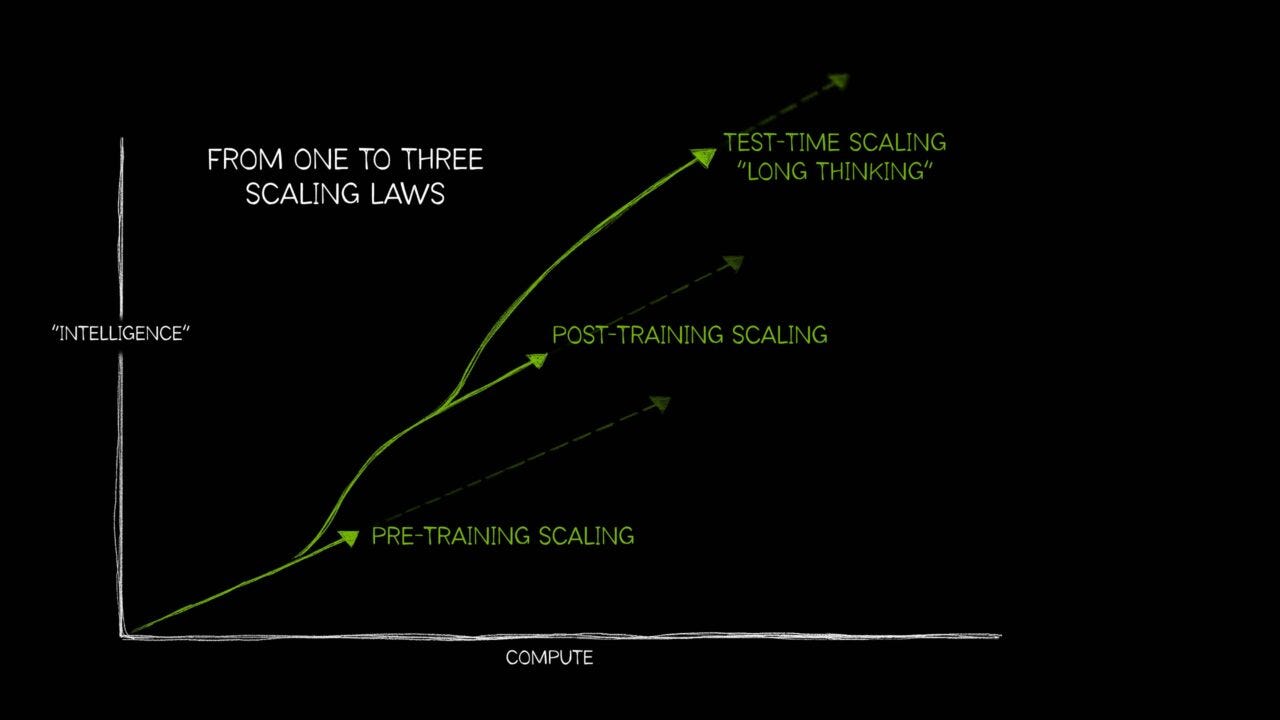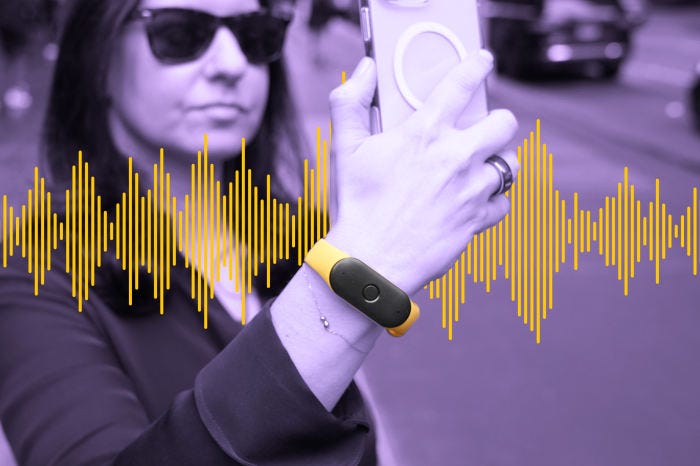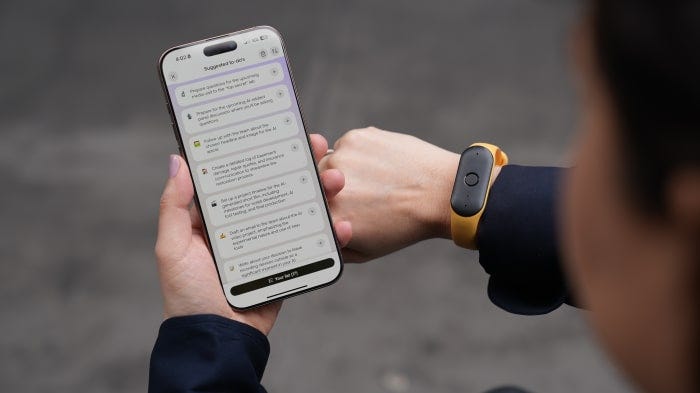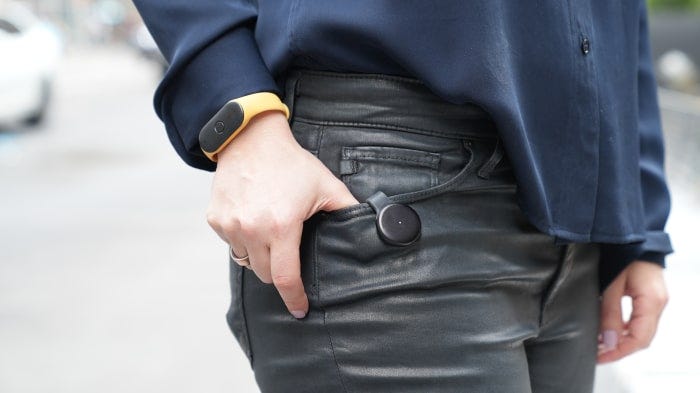
AI: The behavioral impediments of AI voice inputs. RTZ #709
The Bigger Picture, Sunday, May 3, 2025
I’ve discussed the AI industry’s enthusiasm for multimodal AI via voice inputs for a while now. Indeed, all the mainstream LLM AIs now offer robust voice interactivity, with ample choices of voices, intonations, accents etc. But there are deep societal and legal privacy and trust issues around these capabilities, that have to be resolved. And that may take far longer than the technologies being developed to date. That is the Bigger Picture I’d like to unpack this Sunday.
The big tech companies are racing ahead to AI power hundreds of millions devices in our homes and offices giving Amazon Alexas, Apple Siris, Google Gemini Assistants and other devices substantial new AI capabilities with our personal data. The data, organic and synthetic, are needed for AIs to do more interesting things going forward. And new generations of wearables like Smart Glasses from Meta and others, are also racing to incorporate voice data capture as a critical new AI feature in this AI Tech Wave. Not to mention of course OpenAI’s ChatGPT in voice mode at the bleeding edge.
And millions of mainstream users are embracing them, and indeed risking rapid anthropomorphizing with AI, with these rapidly advancing capabilities. And ubiquitous voice recording of our daily environments promise substantial advantages in AI Reasoning and Agents going forward. As well as provide new gushers of new, local data to both train and provide ‘inference data’ for more reliable, and useful AI answers to mainstream queries.
The WSJ’s Joanna Stern did a review of several ‘always on’ voice recorders, that promise to take daily, personal data and convert them into useful AI products and services.
The exercise over several weeks, point to the promise and potential perils of these capabilities. The piece, “I Recorded Everything I Said for Three Months. AI Has Replaced My Memory”, lays it all out, and is worth reading in full. Here are some highlights:
“The Bee, Limitless and Plaud wearables record everything you say and use AI to provide summaries, to-do’s—and a slightly terrifying glimpse of the future.”
“I’ve been wearing a wire everywhere since February.
“I’ve got all the transcripts: important meetings, arguments with my kids, chats with disgruntled employees, late-night bathroom routines. There’s plenty more that I can’t share if I want you (and my bosses and my family) to keep liking me.”
“No, I’m not an FBI informant. I willingly wore a $50 Bee Pioneer bracelet that records everything I say and uses AI to summarize my life—and send me helpful reminders. I also tested two similar gadgets: the $199 Limitless Pendant and the $159 Plaud NotePin. These assistants can recall every dumb, private and cringeworthy thing that came out of my mouth.”
“Is this the dawn of the AI surveillance state? Absolutely. Is it also the dream of hyper-personal, all-knowing AI assistants coming to life? Also absolutely.”
“Within hours of wearing the Bee, I was blown away at how quickly it turned ramblings and random chatter into useful, actionable information. Yet, allow me to quote myself from Feb. 24 at 5:15 p.m.: “This bracelet is really f—ing creepy.”
She goes into the details of these current devices work, and their pros and cons. Both in their hardware and software.
And highlights the critical benefit of feeding our personal data in exchange for much more useful AI memory and services, something I’ve discussed at length since the earliest days here.
“AI is nothing without data. When you feed it everything you’ve said for days, weeks and months, it gets infinitely more useful. Also, yes, it becomes a lot like a “Black Mirror” episode, but we’ll get to that.”
“With massive transcripts of your life, the AI in these apps can:”
• “Summarize: These apps recap your conversations, often reading like a bad biography. Bee summary from April 9: “Joanna’s day was a blend of familiar responsibilities and intense professional engagements…She ended the day listening to music by Sting.” Riveting stuff. Can’t wait for the movie adaptation.”
“The transcriptions themselves aren’t all that accurate but the summaries usually are. Well, except for March 24: “Conversation with Johnnie Cochran about trial evidence.” Yep, just a casual chat with a deceased celebrity lawyer. (I was watching the new O.J. documentary.) Ethan Sutin, co-founder and chief technology officer of Bluush, Bee’s creator, says a recent update has improved the ability to tell recorded voices from real, living ones.”
• “Remind: Turns out, I promise to do a lot of things without putting them on a to-do list. Bee listens for action items and adds them to a suggested list. It’s repeatedly reminded me of important tasks, like calling the plumber or following up on work stuff. But it also hilariously adds things I’d never put on a list, like “check in on your sick son” or “schedule a follow-up with your hair stylist to discuss your haircut.”
“Analyze: Both Bee and Limitless have chatbots so you can ask about your recorded life. I asked Bee for a detailed breakdown of my cursing habits. (Daily average: 2.4 curses.) But it can be genuinely helpful. “Look through my chats with Ethan from Bee and tell me what AI models it uses.” The answer: a combo from Anthropic, Google and Meta.”
But using these devices in public gets into broader issues, both societal and legal:
“Nobody I talked to over the past few months would have known I was recording them, if I hadn’t told them. It’s a little fun, like I’m a low-budget Ethan Hunt. Mostly, though, I just felt like a creep.”
“And, depending on the state, I might have been breaking the law.”
“Most of my recordings were in New Jersey and New York, which are one-party consent states. Only one person—me—had to agree to the recording. But if I were in one of about a dozen states that require two-party consent, I’d need permission from everyone in earshot or end up with a possible civil-liability case.”
“I would make sure everyone has consented verbally,” says Ashton Kirsch, a lawyer with Matthiesen, Wickert & Lehrer, which maintains a state-by-state list of recording laws. While the risk might be low, he adds, “we could never recommend people take that risk.”
“Yet the most unsettling part was realizing the soundtrack of my life was stored on some companies’ servers. Sure, much of our identities are already in the cloud—photos, health records, etc.—but normally, we have some control over what’s there and how it’s stored.”
The companies of course, do their best to protect these voice recordings:
“The creators of Bee and Limitless say they encrypt your data, delete recordings when you delete conversations or your account, and don’t train AI models on the feeds. They also say they don’t sell your data to advertisers; they get revenue via hardware and subscriptions sales. Plaud doesn’t sell data either.”
It’s clear from Joanna’s overall experience, that these new AI capabilities offer immense promise. But there are many issues that need to be addressed before they become truly accepted at mainstream scale in society at large.
And that is the Bigger Picture definitely keeping in mind this AI Tech Wave, as our tech races ahead of our ability to absorb them. Stay tuned.
(NOTE: The discussions here are for information purposes only, and not meant as investment advice at any time. Thanks for joining us here)












